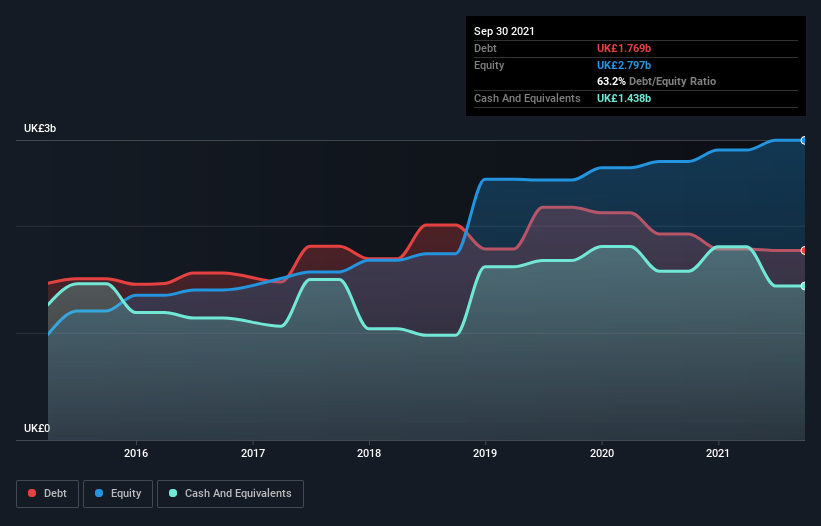
Warren Buffett famously said, 'Volatility is far from synonymous with risk.' So it might be obvious that you need to consider debt, when you think about how risky any given stock is, because too much debt can sink a company. Importantly, DCC plc (LON:DCC) does carry debt. But the more important question is: how much risk is that debt creating?
What Risk Does Debt Bring?
Debt and other liabilities become risky for a business when it cannot easily fulfill those obligations, either with free cash flow or by raising capital at an attractive price. If things get really bad, the lenders can take control of the business. However, a more common (but still painful) scenario is that it has to raise new equity capital at a low price, thus permanently diluting shareholders. Of course, debt can be an important tool in businesses, particularly capital heavy businesses. The first step when considering a company's debt levels is to consider its cash and debt together.
See our latest analysis for DCC
What Is DCC's Net Debt?
You can click the graphic below for the historical numbers, but it shows that DCC had UK£1.77b of debt in September 2021, down from UK£1.92b, one year before. However, because it has a cash reserve of UK£1.44b, its net debt is less, at about UK£331.0m.

How Strong Is DCC's Balance Sheet?
According to the last reported balance sheet, DCC had liabilities of UK£2.92b due within 12 months, and liabilities of UK£2.39b due beyond 12 months. On the other hand, it had cash of UK£1.44b and UK£1.56b worth of receivables due within a year. So it has liabilities totalling UK£2.32b more than its cash and near-term receivables, combined.
This deficit isn't so bad because DCC is worth UK£5.85b, and thus could probably raise enough capital to shore up its balance sheet, if the need arose. But we definitely want to keep our eyes open to indications that its debt is bringing too much risk.
In order to size up a company's debt relative to its earnings, we calculate its net debt divided by its earnings before interest, tax, depreciation, and amortization (EBITDA) and its earnings before interest and tax (EBIT) divided by its interest expense (its interest cover). Thus we consider debt relative to earnings both with and without depreciation and amortization expenses.
DCC has a low net debt to EBITDA ratio of only 0.48. And its EBIT covers its interest expense a whopping 11.1 times over. So you could argue it is no more threatened by its debt than an elephant is by a mouse. Fortunately, DCC grew its EBIT by 6.8% in the last year, making that debt load look even more manageable. There's no doubt that we learn most about debt from the balance sheet. But it is future earnings, more than anything, that will determine DCC's ability to maintain a healthy balance sheet going forward. So if you're focused on the future you can check out this free report showing analyst profit forecasts.
But our final consideration is also important, because a company cannot pay debt with paper profits; it needs cold hard cash. So we clearly need to look at whether that EBIT is leading to corresponding free cash flow. During the last three years, DCC generated free cash flow amounting to a very robust 85% of its EBIT, more than we'd expect. That puts it in a very strong position to pay down debt.
Our View
Happily, DCC's impressive conversion of EBIT to free cash flow implies it has the upper hand on its debt. And the good news does not stop there, as its interest cover also supports that impression! When we consider the range of factors above, it looks like DCC is pretty sensible with its use of debt. While that brings some risk, it can also enhance returns for shareholders. Of course, we wouldn't say no to the extra confidence that we'd gain if we knew that DCC insiders have been buying shares: if you're on the same wavelength, you can find out if insiders are buying by clicking this link.
When all is said and done, sometimes its easier to focus on companies that don't even need debt. Readers can access a list of growth stocks with zero net debt 100% free, right now.
New: Manage All Your Stock Portfolios in One Place
We've created the ultimate portfolio companion for stock investors, and it's free.
• Connect an unlimited number of Portfolios and see your total in one currency
• Be alerted to new Warning Signs or Risks via email or mobile
• Track the Fair Value of your stocks
Have feedback on this article? Concerned about the content? Get in touch with us directly. Alternatively, email editorial-team (at) simplywallst.com.
This article by Simply Wall St is general in nature. We provide commentary based on historical data and analyst forecasts only using an unbiased methodology and our articles are not intended to be financial advice. It does not constitute a recommendation to buy or sell any stock, and does not take account of your objectives, or your financial situation. We aim to bring you long-term focused analysis driven by fundamental data. Note that our analysis may not factor in the latest price-sensitive company announcements or qualitative material. Simply Wall St has no position in any stocks mentioned.
About LSE:DCC
DCC
Engages in the sales, marketing, and distribution of carbon energy solutions worldwide.
Very undervalued with flawless balance sheet and pays a dividend.


